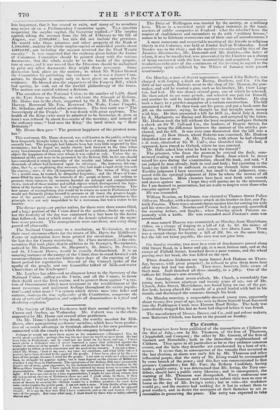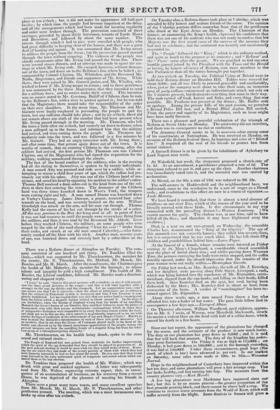Clje Country.
Two narratives have been published of the transactions at Clithero on the 31st of July,—one by Mr. Thomson, of the firm of Thomson, Chippindall, and Company ; the other by Mr. Garnett, of the firm of Garnett and Horsefalls ; both in the immediate neighbourhood of Clithero. They agree in all particulars as far as they embrace common events, and the facts they describe are corroborated by a host of wit- nesses.. It seems that, in consequence of the tumulti that occurred at the last election, an alarm was early felt by Mr. Thomson and other influential people, that the entry of Mr. Irving would be accompanied by some breach of the peace ; and this fear was communicated to that person's Committee; but Mr. Fort, the Reform Candidate having made a public entry, it was determined that Mr. Irving, the Candidate, can- didate, should have a public entry likewise; and in consequence, the warning of Mr. Thomson was disregarded. Every endeavour was made by Messrs. Thomson and Garnett to induce their men to stay at home on the day of Mr. Irving's entry; but in vain—the workmen would go; and the masters had nothing for it but to exhort them to good conduct, and to desire the overseers of their factories to act as constables in preserving the peace. The entry was. expected to talc,
place at ten o'clock ; bat it, did not make its appearance till half-past twelve ; by which time - the people had become impatient at the delay, and all the arrangements which had been made for insuring regularity and order were broken through. The procession consisted of three carriages, preceded by about thirty horsemen, tenants of Lords Howe and Brownlow, and followed by about the same number. The streets through which it had to pass were crowded with people, who had great difficulty in keeping clear of the horses, and there was a great deal of hooting and uproar. It was announced that Mr. Irving meant
to address the people from the SWall ; but the procesion passed onward through the town without stopping. The violence of the people was
chiefly conspicuous after Mr. Irving had passed the Swan Inn. There were several stones thrown, and an attempt was made to upset the car- riage in which Mr. Irving rode. He escaped, however, without damage, out of the town, and drove on to the Bellman's Inn, where he halted ; ac- companied by Colonel Clayton, Mr. Whittaker, and the Reverend Mr. Noble, Magistrates, and friends and supporters of Mr. Irving. While there, they were joined by Mr. Garnett junior, and Mr. Whalley, who wished to know if Mr. Irving meant to ,return ; and to these gentlemen it was announced, by the three Magistrates, that they intended to send for a military force, and to return under their escort. This intention was no sooner stated to Mr. Garstang, Bailiff of Clithero, than he rode to the Bellman's Inn, with a view to protest against it ; but he was told that the Magistrates there would take the responsibility of the order on their own shoulders. In the mean time, Mr. Thomson and Mr. Garnett were busily employed in persuading the people to quit the town, lest any collision should take place ; and by six o'clock, there did not remain above one sixth of the number that had been present when Mr. Irving passed through in the morning. Mr. Thomson, who left the town a little after six o'clock, had scarcely sat down to dinner, when a man galloped up to the house, and informed him that the military had arrived, and were cutting down the people. Mr. Thomson im- mediately rode into the town, and was followed in a few minutes by Mr. Garnett. They had an angry interview with Mr. Irving there ; and after some time, that person again drove out of the town. It is worthy of remark, that on entering Clithero in the evening, after the soldiers had arrived, the first person Mr. Thomson saw was Colonel Clayton, one of the Magistrates who had signed the requisition for the military, walking unmolested through the streets.
The fact of the brutal conduct of the soldiery, who in the evening had all the rioting to themselves, is spoken to by twenty individuals. A man named Atty was pursued and rode over by a soldier, while at- tempting to rescue a child four years of age, which the ruffian had pre- -viously cut with his sabre. Atty was one of the Clithero band of mu- sicians, and saved his head by opposing his sackbut to the soldier's sabre. Thomas Bell received a deep sabre-cut in the head from one of the sol- diers at their first entering the town. The drummer of the Clithero band was three times knocked down in West's Yard; the troopers were cutting right and left. A man named Dunne was knocked down at Varley's Gateway. James Dawson, a grocer, received four sabre wounds on the head, and was severely bruised on the .arm. William Greehalgh was struck on the arm, and his coat cut through. Thomas Kelly had the crown of his hat cut through by the stroke of a sabre. All this was previous to the Riot Act being read at all: in point of fact, it was not had recourse to until the people were everywhere flying from the soldiers, and then it was read by the Reverend Mr. Abbott. Even before they reached Clithero, the military, on some people who were ranged by the side of the road shouting "Fort for ever ! " broke from their ranks, and struck at an old man named Calverley,—who form- /lately warded off the blow with his stick. Another man, seventy years of age, was knocked down and severely hurt by a sabre-blow on the head.



























 Previous page
Previous page